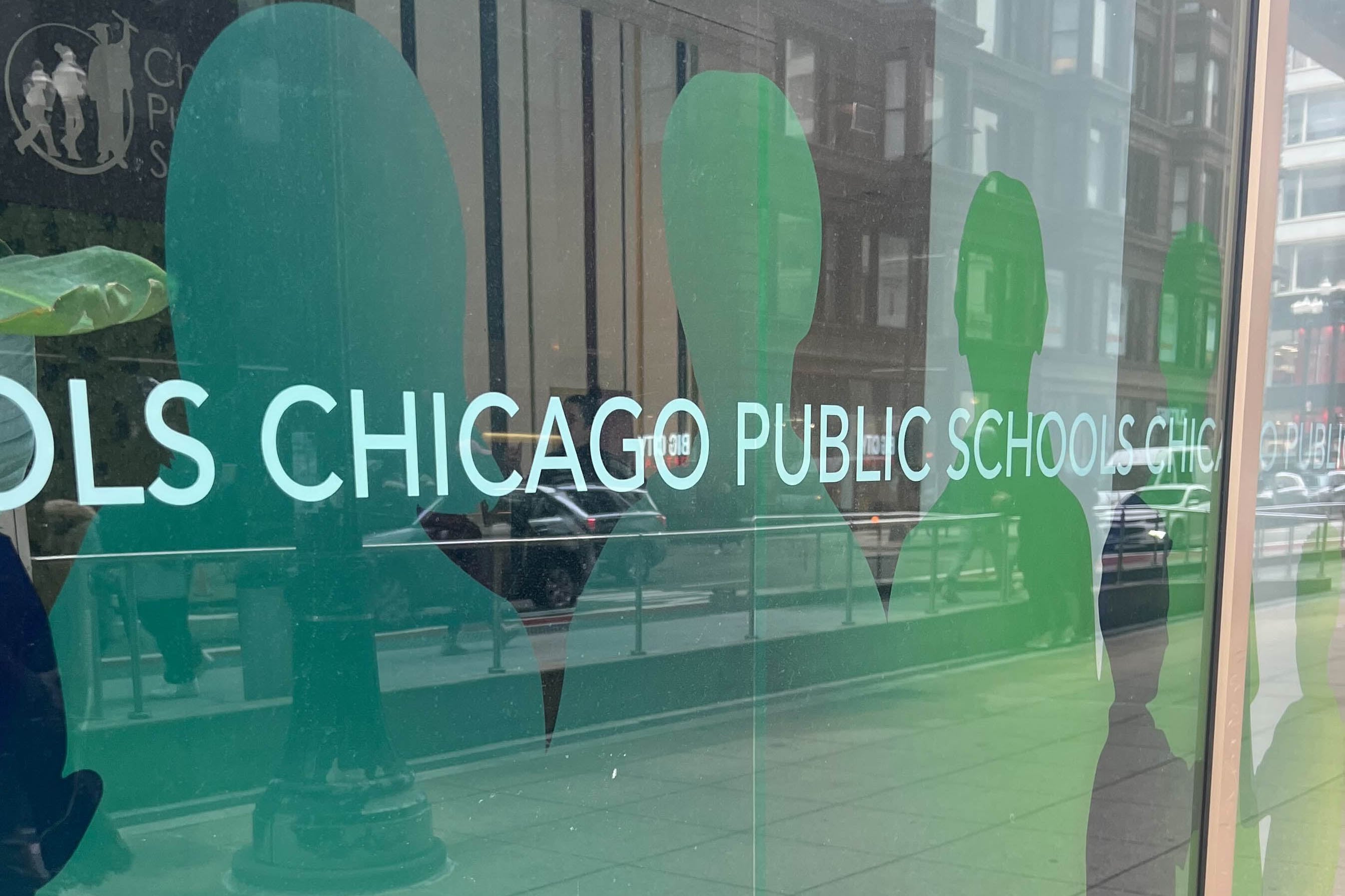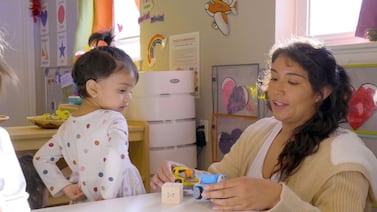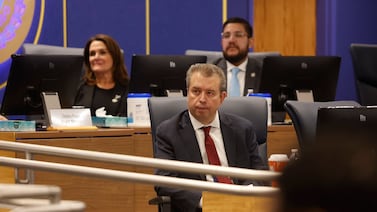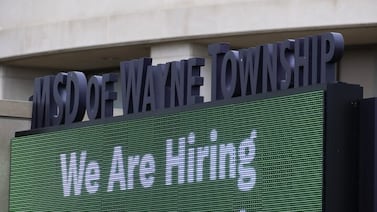Sign up for Chalkbeat Chicago’s free daily newsletter to keep up with the latest education news.
Chicago voters delivered a mixed message in the city’s historic first school board elections Tuesday, backing a set of candidates representing different, sometimes clashing views.
Unofficial results showed four teachers union-backed candidates, three pro-school choice candidates, and three independent candidates either winning or holding leads.
Ten seats representing 10 districts across the city were contested in the election. The winners will join 11 other members appointed by Mayor Brandon Johnson, a former teacher and Chicago Teachers Union organizer. In 2026, all 21 school board seats will be on the ballot.
Tuesday’s election will end 30 years of mayoral control in the nation’s fourth largest school district. It comes at a contentious time: CPS is in a period of leadership turmoil marked by divisions over how to cover costs at a time of expiring COVID aid and enrollment decline.
The makeup of the new board will help shape how the district answers thorny questions about money and its future direction.
Early Wednesday, The Associated Press had yet to declare winners in three races: in Districts 1, 9, and 10.
Based on preliminary results, the board will likely include 15 members either appointed by Johnson or endorsed by the CTU, a close ally of the mayor’s. That means Johnson will likely have a solid bloc of support for policies he and the union support, including avoiding school closures and pumping more money into neighborhood schools.
The other six seats will likely be filled by school choice, charter-aligned, or more independent candidates, who could press for different priorities or challenge Johnson’s agenda.
Some observers and critics of the teachers union have characterized Tuesday’s results as a blow to Johnson and the CTU, given that they spent nearly $2 million to help their endorsed candidates win in three of 10 races.
But others, especially CTU president Stacy Davis Gates, framed the election as a success. At a union election watch party Tuesday night, she led the crowd in a chant of “Whose Schools? Our schools!”
“You all created an expansion of democracy in an entire society that’s toying with the idea of fascism,” Davis Gates said.
She decried an influx of large checks, including some from out-of-state billionaires, in support of pro-school choice candidates.
Chicago Democrats For Education, a political organization that backed candidates who weren’t endorsed by the union, claimed victories in at least three races: Districts 3, 4 and 8.
“I am incredibly proud of the campaigns all our candidates ran,” Hugo Jacobo, the organization’s executive director, said in a statement. “These candidates had to fight through desperate lies and misinformation spread about them. This is a clear signal against CTU’s agenda—and just the beginning of a transformation in Chicago’s educational opportunities for students and not self interested union bosses.”
Earlier in the day, Chicago Board of Elections spokesperson Max Bever said voters in a few precincts were given ballots with the wrong school board district candidates. The mixups occurred because the new electoral districts don’t follow ward and precinct lines.
“It looks like this issue was raised fairly immediately, and proper ballots were located,” Bever said, adding that he did not know how many voters were impacted.
Unofficial results showed 63% of all registered voters had voted, according to the city’s Board of Elections.
A total of 47 people filed to run for school board, but just 31 made it on the ballot. Candidates staked out positions on school choice, taxes, and district leadership. The campaign was distinguished by big spending and sharp words over the role the teachers union and education reform advocates have played in the race.
District 1: Far Northwest Side, Irving Park
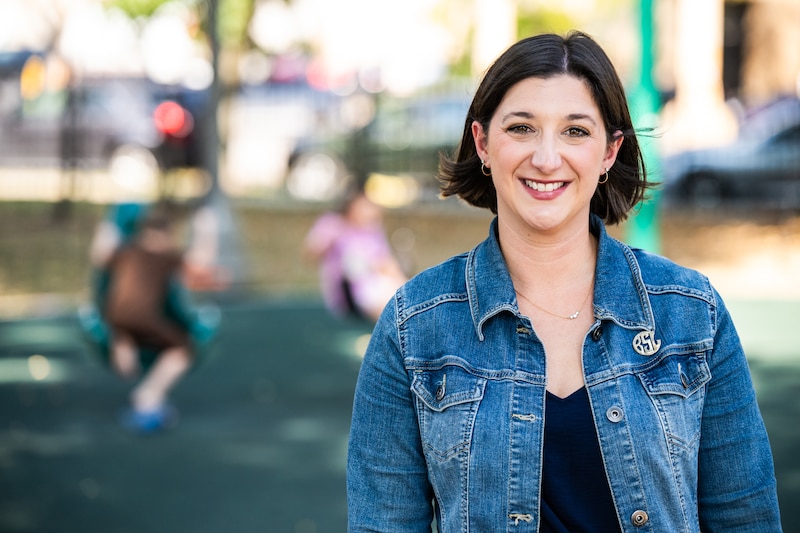
Jennifer Custer, a former teacher and CPS mom, appeared to clinch a narrow victory against Michelle N. Pierre in the race to represent families and residents on Chicago’s Northwest Side in District 1.
“We worked really hard and knocked on a lot of doors and talked to a lot of voters,” Custer said when reached by phone late Tuesday night. She said it felt “surreal” to be part of the historic first school board elections in Chicago.
Moving forward, Custer said she wants to start building relationships with other new school board members.
“All of us have to work as a team,” she said. “We have a common vision and a common goal, and I think that’s the students of CPS and making sure we can do the best for them.”
Both candidates raised more than $100,000 in their bids to secure a seat on the board. Custer brought in significant amounts from labor unions, including the Chicago Teachers Union, which endorsed her candidacy. Pierre received backing from pro-school choice groups and benefited from spending by two super PACs supporting school choice candidates.
At an election night party downtown, Pierre said she was on “pins and needles,” unsure how the race would shake out.
Pierre said every moment of Election Day was stressful. But she said she felt hopeful when she met a voter at a poll who said she came to vote specifically for presidential candidate and vice president Kamala Harris — and Michelle Pierre.
“I know that my message resonated with a lot of people,” Pierre said.
In all, 43 schools in District 1 serve 32,410 students, most of whom are Hispanic and white. There is one charter school and one alternative school.
District 2: Rogers Park, Edgewater, Lincoln Square, Albany Park
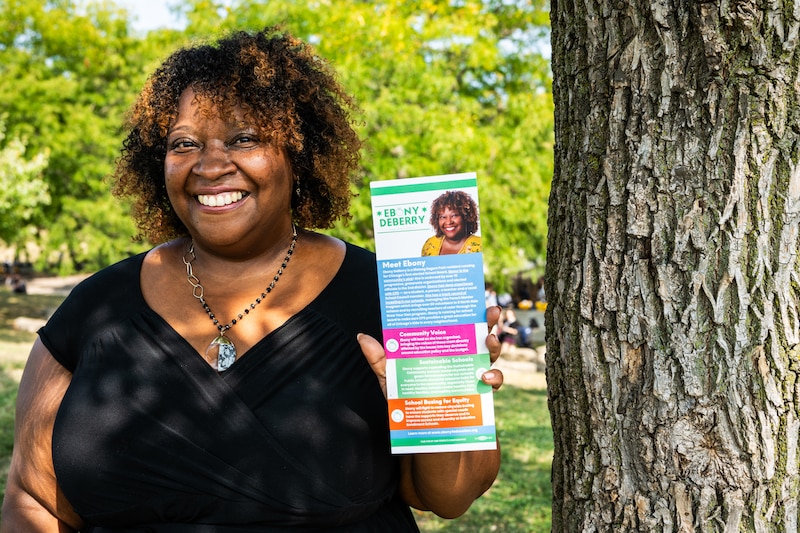
Ebony DeBerry, a former teacher and the CTU-backed candidate, won a four-way race to represent District 2, which spans the city’s far north lakefront, according to unofficial results.
She’s one of three CTU-backed candidates to win in the 10 contests for school board seats.
At a CTU election watch party, DeBerry’s voice broke as she spoke about backing from educator volunteers and others for her campaign.
“This has not been easy and it hasn’t been short,” she said. “I am ready to brawl and fall for you guys.”
DeBerry portrayed herself as a true product of public schools and the confidence teachers instilled in her and vowed to be an advocate for students and teachers. She said she will push for expanded staffing, including for counselors, social workers and librarians, and more sports, arts and other programs.
She edged out Bruce Leon, a retired human resource entrepreneur who self-funded his campaign and argued for a fiscally prudent approach to running the school district. DeBerry also beat Kate Doyle, a former teacher and nonprofit cofounder who tried to position herself as an independent-minded progressive candidate, and CPS mom Maggie Cullerton Hooper, the daughter of former Illinois Senate President John Cullerton, who ran on a progressive platform.
District 2 serves 27,637 students in 37 schools, including three magnets and three charters.
District 3: Logan Square, Humboldt Park, Hermosa
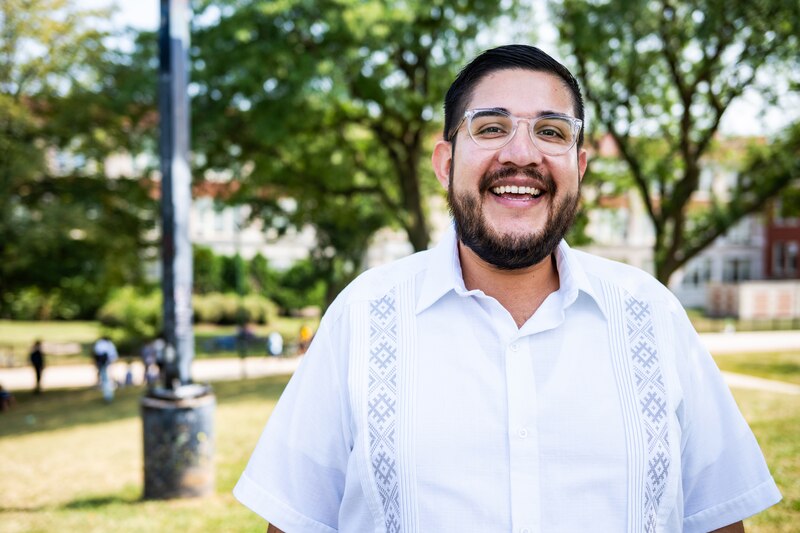
Carlos Rivas Jr. notched a victory over Jason Dónes in the predominantly Latino District 3, according to unofficial results from the Chicago Board of Elections.
District 3 includes 55 schools serving 31,598 students, many of whom are bilingual or English language learners.
The two candidates have similar backstories: Both grew up in Humboldt Park, graduated from coveted selective enrollment high schools, and went on to work as educators through the Teach for America program.
But the two diverged on school choice. Rivas formerly worked at the Noble Network of Charter Schools and has said he will be an independent board member devoted to preserving the variety of schools that exist today, including charter, magnet, and selective schools. He drew financial support from the Illinois Network of Charter Schools and another pro-school choice group and has received a slew of small-dollar donations.
Dónes raised more than $300,000, largely from the teachers union and its allies, while Rivas brought in just over $75,000. However, super PACs, which are not allowed to coordinate with candidates, spent more than $280,000 in support of Rivas.
At an election night party, Rivas said the amount of attack ads against him were hurtful, especially mailers that stuck his face next to Donald Trump. He said he proudly voted for Kamala Harris today.
Rivas, who has run on a platform that’s critical of the mayor, said he hopes to work to build consensus with the board. A majority of the board will still be made up of mayoral appointments.
“It’s gonna be really difficult with 21 members, but we have to be able to do that for the good of our city, for the good of our students and our families,” he said.
Dónes is backed by the CTU and other unions as well as some local elected officials. He ran on a progressive platform focused on expanding school staffing and ensuring curriculums are culturally relevant.
District 4: Lakeview, Lincoln Park
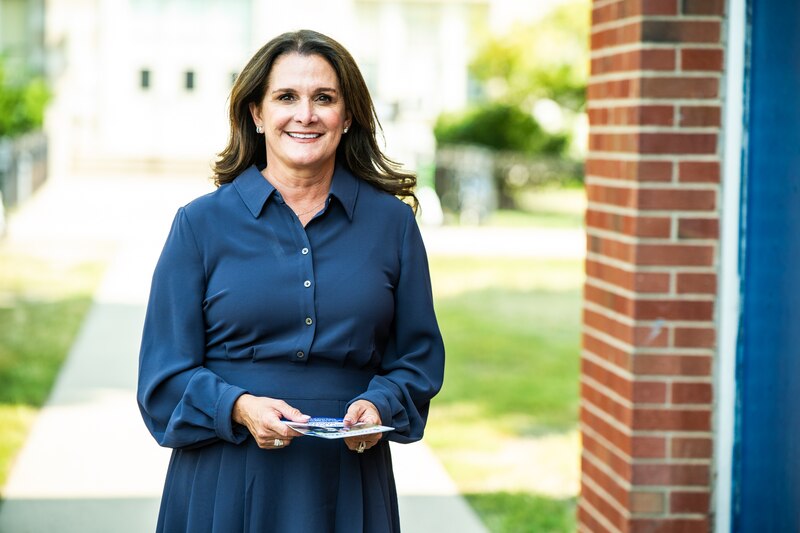
Ellen Rosenfeld, a former CPS teacher who currently works for the district doing family engagement, won a competitive race to represent neighborhoods along Chicago’s north lakefront.
The area includes 36 schools with diverse student bodies. Just over a third of students attending District 4 CPS schools are white, roughly one third are Hispanic, just under 16% are Black, and 8.5% are Asian American. There are no charters and about a dozen selective enrollment and magnet schools.
Rosenfeld said Wednesday that the win feels like a vindication after facing an onslaught of negative messaging that she argued aimed to mislead voters. She said she feels district residents gravitated toward a long-time neighbor, parent and educator — and, as turmoil in CPS leadership grew, increasingly spoke of wanting a counterweight to the mayor and the teachers union.
“I think that CTU and the mayor underestimated how smart the constituents are when they sent the ads that said I was the Trump puppet in Project 2025,” she said, noting it was easy for voters to confirm she is a lifelong Democrat. “Arguably it worked in my favor.”
“I know the ecosystem that is Chicago public schools, and I’m ready to do the work on day one,” she added.
Karen Zaccor, a retired CPS teacher and longtime community organizer who advocated for an elected school board, was behind Rosenfeld. Zaccor is backed by the Chicago Teachers Union and raised almost $236,000, the most of any District 4 candidate.
Zaccor said the CTU-backed candidates who did not win will remain active in school advocacy.
“No matter the outcome of the election, we’ll all continue in this fight,” she said.
Zaccor lives on the opposite side of the district from Rosenfeld, meaning she could be a potential choice for the mayor as part of his 11 appointments for the board.
That’s because of the way state law established representation on the new board. Each district will be split into two districts for the 2026 election. Tuesday’s winners become incumbents in the subdistrict in which they live, while Johnson must appoint people by Dec. 16 to represent the other subdistrict.
Other candidates who were vying to represent District 4 on the school board were Kimberly Brown, a marketing professional and adjunct professor at two colleges; Andrew A. Davis, a former owner of a brokerage firm and former head of a state agency focused on higher education who now heads up an education-related nonprofit; Thomas Day, a veteran who is an adjunct professor at the University of Chicago Harris School of Public Policy; and Carmen Gioiosa, a former CPS teacher and central office staffer who now teaches early childhood education at National Louis University. Every candidate has children who are CPS students or graduates.
Rosenfeld, who has been endorsed by a slew of state and local elected officials, has raised nearly $187,000. After Rosenfeld and Zaccor, the rest of the candidates raised nearly $25,000 or less.
District 5: West Side, West Loop, Near West Side
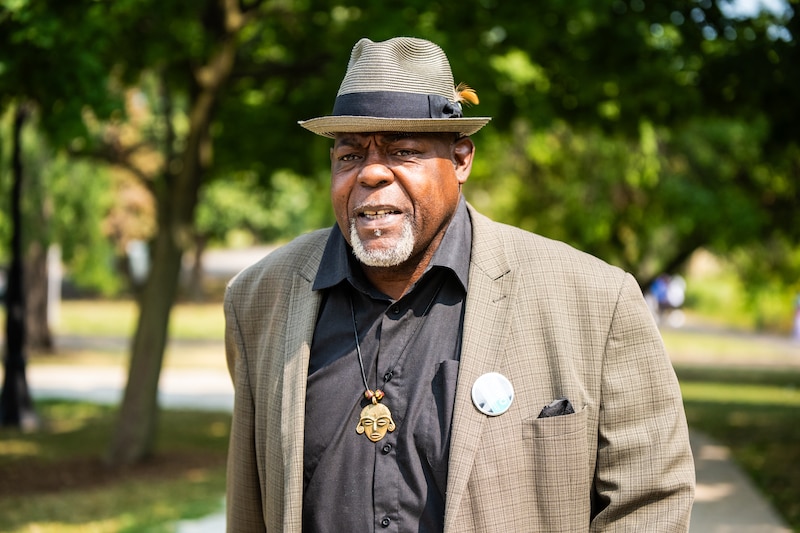
Aaron “Jitu” Brown will represent District 5, which spans from the West Loop to Austin and includes 105 schools — the most of any school board district.
Brown is a longtime community organizer who has fought school closures and advocated for an elected school board. He was endorsed by the Chicago Teachers Union and ran uncontested after Michillia Blaise withdrew from the race in early September. Blaise has since been appointed by Mayor Brandon Johnson to serve on the school board.
In District 5’s public schools, 62% of students are Black, 5% white, almost 28% Hispanic, and nearly 3% Asian American. A quarter of these schools in District 5 are charters.
District 6: Downtown, Bronzeville, Near South Side
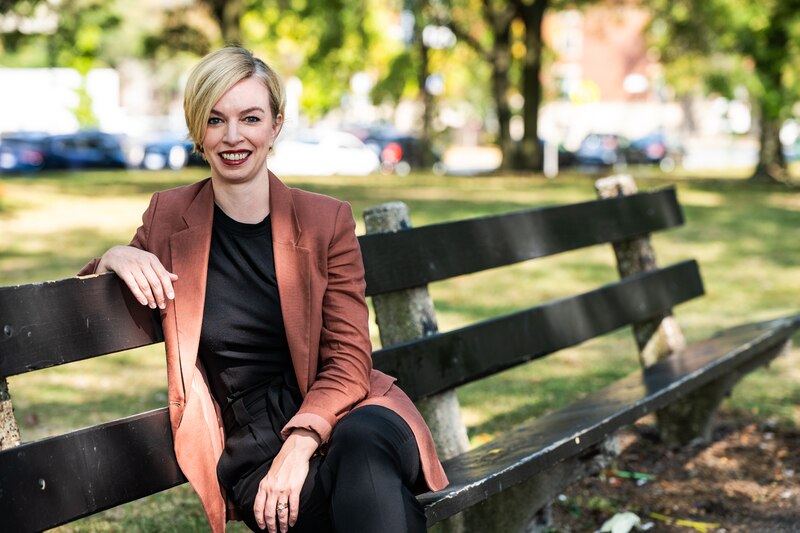
Former CPS principal Jessica Biggs won election to represent District 6, which features a diverse school population serving several South Side neighborhoods..
Biggs ran on a platform of being an independent voice. A CTU-backed candidate, policy advocate Anusha Thotakura, finished second while Andre Smith, a finance manager, finished third. Danielle Wallace, a nonprofit leader, ran as a write-in candidate.
Biggs expressed surprise at the outcome given the large disparity in spending. Biggs raised the least of the three candidates on the ballot — about $42,600 as of the most recent filings – while Thotakura’s campaign had brought in more than $360,000.
“You never really know the impact that that money is going to have,” Biggs said. “I knew … talking with voters, talking with people at forums that our message was resonating with voters across the district. I knew people wanted an independent voice on the board.”
District 6 covers neighborhoods on the city’s South Side, such as Englewood, Greater Grand Crossing, Woodlawn and Hyde Park and neighborhoods on the city’s north side such as Streeterville and River North.
The district has over 50 schools with 21,000 students enrolled. The district’s population is majority white, but Black students are the majority of schools. About 70% of students enrolled in the district’s schools come from low-income families and 15% of students have Individualized Education Programs.
Thotakura lives on the opposite side of District 6 from Biggs, so Mayor Johnson could still choose to appoint her to the school board.
District 7: Pilsen, Little Village, Bridgeport, Brighton Park
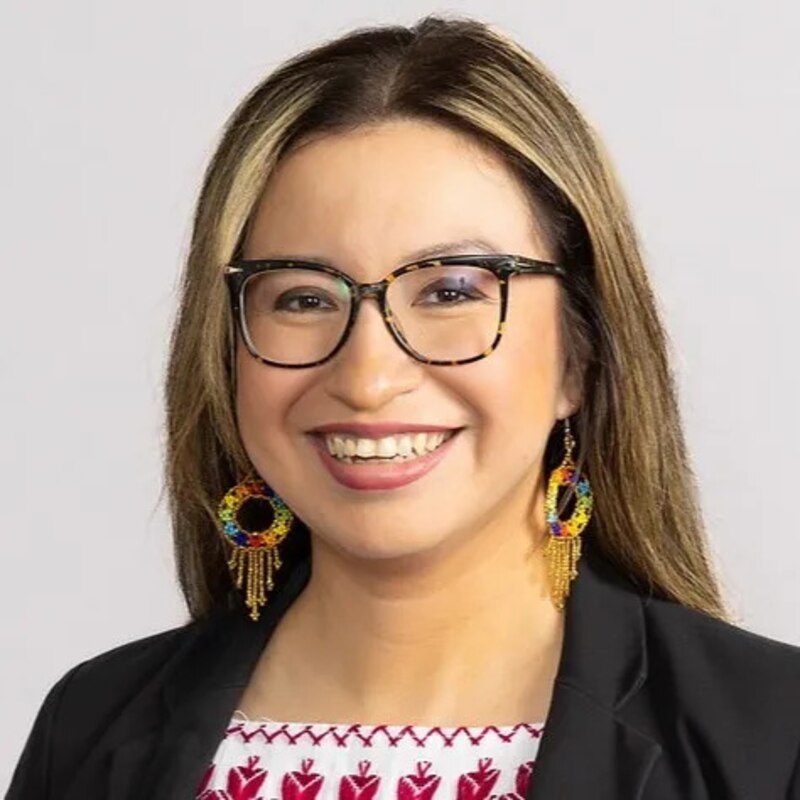
Yesenia Lopez won in a three-way contest to represent District 7, which covers parts of the city’s South and Southwest sides.
The district has 79 schools with nearly 45,000 students — the most student enrollment of any school board district.
Lopez, a CPS graduate, is an executive assistant for the Illinois Secretary of State and has worked in multiple state and federal campaigns. She was endorsed by the CTU and Congressman Jesus “Chuy” Garcia. According to recent vote counts from the Board of Elections, she is ahead of Eva A. Villalobos, also a CPS graduate and a former accountant and mother of four children who attend private schools, and Raquel Don, a CPS graduate and parent, former accountant, and current member of the Jones College Prep Local School Council.
At the union election watch party, Lopez said her victory was a collaborative effort, with unions, elected officials, and fellow Southwest Side residents backing her campaign.
“It was not Yesenia on the ballot,” she said. “It was a community on the ballot.”
She said she would be a champion of working class families, advocating specifically for more afterschool programs and special education services.
“We still have many challenges ahead,” she said. “We saw out-of-state billionaires trying to buy our education system.”
Villalobos also noted that a lot of money was spent in the District 7 school board race.
“I’d like to think I made them sweat,” she said with a laugh.
Of the three candidates, Lopez has raised nearly $167,000. Villalobos has raised nearly $37,000, including from Urban Center PAC, led by former CPS CEO and mayoral candidate Paul Vallas. Don has collected nearly $3,000.
She said her advice to Lopez, which she has previously shared with her, is that she wants her to make her decisions independently without considering the agenda of political or private interests.
“I wanna make sure whatever decision she makes comes from her and not from the union and another bigger group,” Villalobos said. “We are being elected in this position because we are supposed to represent our students. We are supposed to speak on behalf of our parents. And overall make sure we increase and better our schools.”
District 8: Far Southwest Side, Back of the Yards
Angel Gutierrez, a nonprofit consultant, will represent voters in District 8. Unofficial results from the city’s board of elections show that Gutierrez beat his opponent Felix Ponce, a CPS music teacher and CTU-backed candidate, in a landslide.
At an election night party Tuesday, Gutierrez said his immediate priority in office will be to do a “forensic analysis” of the district’s expenses and understand how to solve CPS’s budget challenges and get the “maximum dollars into the classroom.”
One of the lessons that he said he’ll bring with him from the campaign trail is to always “elevate” the students who are the most vulnerable, such as those with disabilities.
“These are elected positions. I am beholden to the people who elected me and even the people who didn’t vote for me — I’m representing them,” he said. “That means listening to parents, listening to students, listening to teachers, listening to elected people.”
Gutierrez and Ponce were the only two candidates vying to represent families and school communities on Chicago’s Southwest Side and a smaller sliver of the Loop. District 8 includes neighborhoods like West Lawn, Marquette Park, Ashburn, McKinley Park, and Bridgeport.
Ponce raised around $295,000, while Gutierrez brought in about $86,000. A majority of Ponce’s campaign funds came from the CTU and other contributions from state and local officials. Gutierrez received money from the Illinois Network of Charter Schools. Two super PACs supporting pro-school choice candidates also spent at least $270,000 on direct mail and ads in support of Gutierrez.
CTU-backed Ponce lives on the opposite side of District 8 as Gutierrez and could be considered by Mayor Johnson for an appointment to the school board.
District 9: Englewood, Roseland, Beverly, Morgan Park
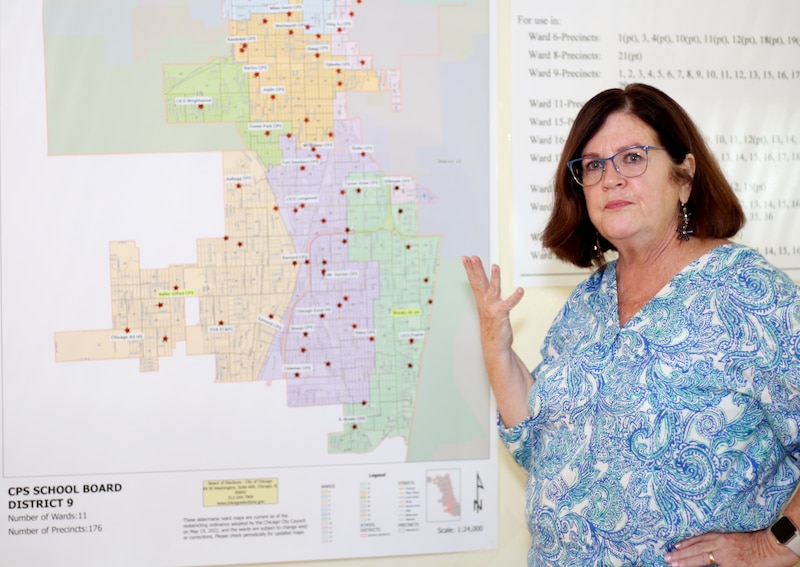
Therese Boyle looks to have secured a seat on Chicago’s Board of Education to represent District 9. According to unofficial results from the city’s board of elections, Boyle won an overwhelming majority of votes cast in Tuesday’s race. The AP had not called the race as of early Wednesday.
Boyle was in a four-way race with Lanetta Thomas, who was endorsed by the CTU, La’Mont Raymond Williams, and Miquel Lewis, who received financial support from pro-school choice PACs.
Boyle, a former longtime Chicago teacher, ran against Stacy Davis Gates for CTU president in 2019; Lewis served on the school board for a brief time under former Mayor Lori Lightfoot and is the acting director of Cook County Juvenile Probation and Court Services. Thomas is a U.S. Army veteran and community organizer in Roseland and Willians is chief of staff and general counsel to a Cook County commissioner.
District 9 covers the city’s south side in neighborhoods such as Morgan Park, Roseland, Pullman, Beverly, Auburn-Greshman, and Englewood.
Candidates raised a combined $108,000 for their campaigns, according to a Chalkbeat analysis of most recent campaign finance disclosures. Boyle raised the most, with over $55,000 coming from her own pockets, small donations, and loans. Lewis’ campaign raised the second highest amount, over $27,000. Two pro-school choice super PACs also spent more than $300,000 in support of Lewis, though by law they are not allowed to coordinate with candidates.
District 10: Hyde Park, South Shore, Woodlawn, Southeast Side
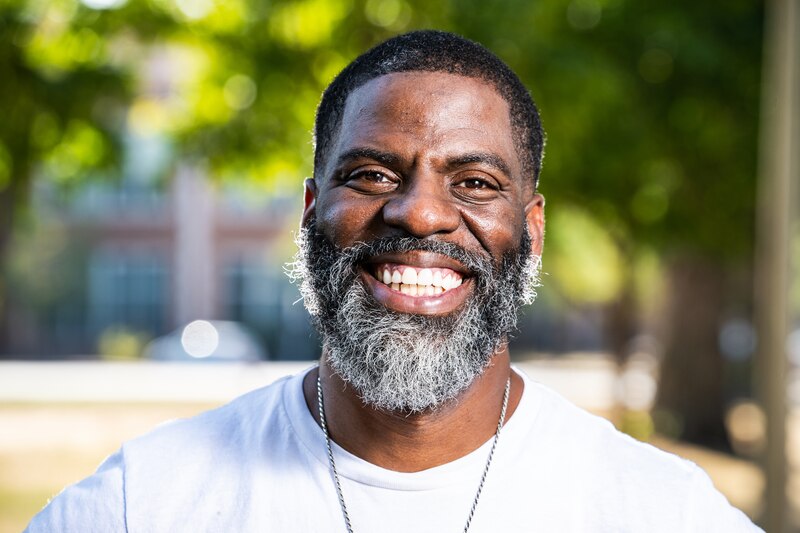
Rapper Che “Rhymefest” Smith appears to have beat all three of his opponents to represent District 10. Early Wednesday, Smith held a narrow lead over Karin Norington-Reaves, who also captured a large number of voters in District 10 according to unofficial results.
In one of the city’s most spread-out and socioeconomically diverse districts, four candidates were vying for the school board seat.
The Rev. Robert Jones, one of the hunger strikers who opposed the closure of Dyett High School in 2015, received a significant financial and in-kind boost from the CTU. Nonprofit CEO Norington-Reaves, the mother of a CPS student with a disability, got the backing of pro-school choice super PACs and what she described as an “anti-CTU coalition” concerned about the union’s growing influence.
Education consultant and former CPS principal Adam Parrott-Sheffer billed himself as an independent-minded candidate and the only one with both experience as a CPS educator and children attending the district. And rapper Smith, who garnered endorsements from some high-profile elected officials, said he would be a creative change agent on the board.
Meanwhile, a former CPS educator and teachers union official, Rosita Chatonda, ran as a write-in candidate after petition challenges knocked her off the ballot.
There are roughly 90 CPS schools in District 10 serving 34,700 students. With both popular specialized programs and campuses that have struggled with rapidly shrinking enrollment, the district captures the uneven student experiences in CPS.
Reema Amin is a reporter covering Chicago Public Schools. Contact Reema at ramin@chalkbeat.org.
Mila Koumpilova is Chalkbeat Chicago’s senior reporter covering Chicago Public Schools. Contact Mila at mkoumpilova@chalkbeat.org.
Samantha Smylie is the state education reporter for Chalkbeat Chicago covering school districts across the state, legislation, special education and the state board of education. Contact Samantha at ssmylie@chalkbeat.org.
Becky Vevea is the bureau chief for Chalkbeat Chicago. Contact Becky at bvevea@chalkbeat.org.

